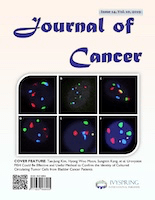
Journal of Cancer
Scope & Guideline
Championing open access to vital cancer research.
Introduction
Aims and Scopes
- Cancer Biology and Mechanisms:
Research exploring the cellular and molecular mechanisms underlying cancer development, progression, and metastasis. This includes studies on signaling pathways, genetic mutations, and the tumor microenvironment. - Clinical Oncology and Therapeutics:
Investigations into the efficacy and safety of cancer treatments, including chemotherapy, immunotherapy, and targeted therapies. This encompasses clinical trials and pharmacogenomic studies aimed at optimizing treatment protocols. - Epidemiology and Prevention:
Studies focused on cancer risk factors, prevention strategies, and the impact of lifestyle on cancer incidence and outcomes. This includes population-based research and analyses of health disparities. - Biomarkers and Diagnostics:
Research aimed at identifying and validating biomarkers for cancer detection, prognosis, and treatment response. This covers liquid biopsies, imaging techniques, and molecular profiling. - Patient Care and Survivorship:
Exploration of the psychosocial aspects of cancer care, including patient-reported outcomes, quality of life, and survivorship issues. This area emphasizes the importance of holistic care in cancer management. - Translational Research:
Studies bridging laboratory findings with clinical applications, focusing on how discoveries in cancer biology can lead to practical advancements in treatment and patient care.
Trending and Emerging
- Immunotherapy and Immune Microenvironment:
A significant increase in research examining the role of the immune system in cancer treatment, particularly studies exploring the efficacy of immunotherapies and the characterization of tumor-infiltrating lymphocytes. - Liquid Biopsy Technologies:
Growing interest in liquid biopsy techniques for cancer detection, monitoring, and treatment response assessment. This includes research on circulating tumor DNA and exosomal markers. - Personalized Medicine and Genomics:
A trend towards personalized cancer treatment approaches based on genomic profiling and molecular characterization of tumors. This includes studies exploring biomarkers for treatment selection. - AI and Machine Learning in Oncology:
Increasing incorporation of artificial intelligence and machine learning methodologies in cancer research, particularly for diagnostics, treatment prediction, and patient stratification. - Metabolism and Cancer:
Emerging investigations into the metabolic pathways involved in cancer progression and treatment resistance, highlighting the importance of metabolic reprogramming in tumor biology.
Declining or Waning
- Basic Science without Clinical Relevance:
There has been a noticeable decline in studies that focus solely on basic cancer biology without a clear clinical application or translational aspect. This suggests a growing preference for research that can directly inform clinical practice. - Single-Agent Therapies:
Research focused exclusively on single-agent therapies has become less common, as there is a shift towards combination therapies and personalized medicine approaches in cancer treatment. - Historical Cohort Studies:
While still relevant, traditional cohort studies that do not incorporate modern technologies (like genomics or AI) appear to be less frequent, indicating a trend towards more innovative methodologies. - Non-Targeted Prevention Strategies:
There seems to be a decline in studies centered on non-targeted prevention strategies, such as general lifestyle modifications, as the focus shifts to more personalized prevention approaches based on genetic and molecular profiling.
Similar Journals

CANCER
Transforming knowledge into healing in the fight against cancer.CANCER, published by Wiley, stands as a pivotal journal in the field of oncology and cancer research, boasting an impressive impact factor and consistently dynamic growth since its inception in 1948. With an ISSN of 0008-543X and an E-ISSN of 1097-0142, this esteemed journal is recognized for its rigorous peer-reviewed articles, making significant contributions to the understanding of cancer biology, treatment modalities, and clinical practices. CANCER holds a distinguished position in the academic community, securing its placement in the Q1 category for both cancer research and oncology, and ranks within the top percentiles on Scopus, indicating its high impact and relevance. The journal is particularly beneficial for researchers, professionals, and students seeking to stay abreast of the latest advancements in cancer science. By addressing essential research questions and providing pathways for new therapies, CANCER continues to play a crucial role in shaping the future of oncology and improving patient outcomes.
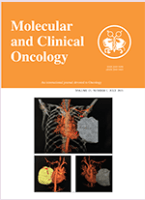
Molecular and Clinical Oncology
Empowering breakthroughs in cancer biology and treatment.Molecular and Clinical Oncology is a dynamic journal published by SPANDIDOS PUBL LTD, aimed at advancing the understanding of cancer biology and treatment modalities. With an ISSN of 2049-9450 and an E-ISSN of 2049-9469, the journal serves as a critical platform for researchers and clinicians dedicated to uncovering novel insights in molecular oncology and enhancing clinical practices. As a testament to its growing influence, the journal has achieved a Q3 ranking in Oncology and a Q4 ranking in Cancer Research for the year 2023, reflecting its commitment to publishing high-quality research. Although currently not an Open Access publication, the journal offers crucial subscription options, ensuring comprehensive access to groundbreaking studies and innovations in the field. With converged years spanning 2018 to 2024, the journal is set to continue enriching the academic community with its valuable contributions, ultimately empowering researchers, professionals, and students engaged in the fight against cancer.
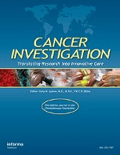
CANCER INVESTIGATION
Illuminating pathways in oncology through peer-reviewed excellence.CANCER INVESTIGATION is a distinguished peer-reviewed journal published by Taylor & Francis Inc, dedicated to the advancing field of cancer research and oncology. With an ISSN of 0735-7907 and E-ISSN of 1532-4192, this journal has been a pivotal resource for professionals and researchers since its inception in 1983, continually contributing to the evolving landscape of cancer investigation until its convergence in 2024. CANCER INVESTIGATION boasts noteworthy rankings in 2023, including Q3 in Cancer Research and Q2 in Medicine (miscellaneous), highlighting its relevance and impact in these critical areas. The journal's commitment to disseminating innovative research and comprehensive reviews makes it an essential platform for those engaged in cancer studies and related disciplines. While currently not available as an open-access publication, CANCER INVESTIGATION remains an invaluable tool for understanding the complexities of cancer, offering insights that drive scientific advancements and improve patient outcomes.

Cancer Medicine
Exploring breakthroughs in oncology and radiology.Cancer Medicine is a leading open access journal published by WILEY, focusing on innovative research and advancements in the fields of Cancer Research, Oncology, and Radiology, with an impressive impact evidenced by its 2023 Q2 ranking in Cancer Research and Q1 rankings in both Oncology and Radiology, Nuclear Medicine and Imaging. With an ISSN of 2045-7634, this journal has been committed to disseminating pivotal findings since its inception in 2012, serving as a vital platform for researchers, practitioners, and students alike. The journal proudly embodies the spirit of open access, ensuring that groundbreaking cancer research is accessible to a global audience. Located in the United Kingdom, it spans a wide array of topics, promising comprehensive insights into cancer therapies, molecular mechanisms, and imaging techniques, thereby significantly contributing to the enhancement of cancer care and treatment outcomes. Researchers interested in exploring the latest advancements in cancer medicine will find this journal an indispensable resource.

Cancer Communications
Advancing the Frontiers of Cancer ResearchCancer Communications, published by WILEY, is a leading open-access journal that has positioned itself at the forefront of cancer research and oncology since its inception in 2017. With an impressive HIndex reflective of its scholarly impact and recognized in the Q1 category for both Cancer Research and Oncology as of 2023, this journal consistently ranks in the top echelons of its field, specifically at Rank #16/404 and Rank #13/230 in their respective categories on Scopus. Cancer Communications aims to disseminate cutting-edge research findings, innovative methodologies, and significant advancements in cancer treatments, thereby fostering a deeper understanding of oncology among researchers, healthcare professionals, and students. The journal operates under an Open Access model since 2018, ensuring that vital research is accessible to a global audience, thus enhancing collaboration and knowledge sharing necessary to tackle one of the most pressing health challenges of our time. Located in Hoboken, NJ, United States, and with a strong commitment to scientific excellence, Cancer Communications remains an essential resource for anyone engaged in the fight against cancer.

Cancer Control
Transforming insights into impactful cancer solutions.Cancer Control is a prominent open-access journal published by SAGE Publications Inc, dedicated to advancing the field of oncology, hematology, and general medicine since its inception in 1995. With a focus on disseminating high-quality research, the journal contributes significantly to the knowledge base surrounding cancer prevention, treatment, and survivorship, making it a vital resource for researchers, healthcare professionals, and students alike. The journal currently holds a commendable position in the academic landscape, ranking in the Q2 category for both Hematology and Oncology, highlighting its impact and scholarly relevance. Available in an open-access format since 2018, Cancer Control ensures that critical findings are accessible to a broad audience, promoting collaboration and innovation in cancer-related research. Whether you're interested in the latest clinical trials, epidemiological studies, or public health initiatives, this journal serves as a key platform for sharing significant developments in cancer care and control.

BMC CANCER is a prestigious, peer-reviewed journal dedicated to advancing the field of cancer research and oncology since its inception in 2001. Published by BMC, a leading name in open-access publishing, this journal plays a crucial role in providing researchers, professionals, and students with a platform for high-quality scientific discourse. With an impressive impact factor, BMC CANCER is ranked in the Q2 quartile across multiple categories, including Cancer Research, Genetics, and Oncology, reflecting its commitment to impactful research and rigorous peer-review standards. The journal ensures broad accessibility to its content through its Open Access model, allowing findings to reach a global audience without financial barriers. The editorial board consists of recognized experts committed to fostering innovation and collaboration within the cancer research community. Researchers working at the intersection of cancer biology, treatment options, and genetic influences will find BMC CANCER an invaluable resource for sharing their findings and engaging with the latest developments in the field.
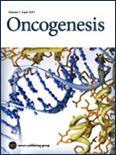
Oncogenesis
Leading the charge in oncogenesis research and education.Oncogenesis is a prestigious open access journal, published by SpringerNature, dedicated to advancing our understanding of cancer biology and molecular mechanisms of oncogenesis. Since its inception in 2012, this journal has quickly established itself as a leading platform for innovative research, being ranked in the Q1 quartile in both Cancer Research and Molecular Biology categories for 2023. With an admirable impact factor that reflects its exceptional quality, Oncogenesis is indexed in Scopus, holding notable rankings in both Molecular Biology and Cancer Research, placing in the 87th and 83rd percentile respectively. The journal not only facilitates the dissemination of groundbreaking research but also encourages collaboration among scientists and healthcare professionals across the globe. By offering open access to its articles, Oncogenesis ensures that vital findings reach a diverse audience, fostering a deeper dialogue and understanding in the fight against cancer. Based in the United States but with a global reach, the journal remains committed to publishing high-impact studies that contribute to the advancement of knowledge in the realms of oncology, biochemistry, and genetics.
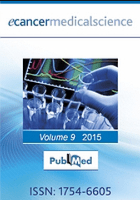
eCancerMedicalScience
Advancing cancer research for a healthier tomorrow.eCancerMedicalScience, a leading open-access journal published by the eCancer Global Foundation, is dedicated to advancing the field of cancer research and oncology. With its inception in 2007, this esteemed journal has emerged as a pivotal platform for disseminating groundbreaking research, innovative treatments, and comprehensive reviews in the cancer domain. Based in the United Kingdom, eCancerMedicalScience has continuously contributed to the academic community with its rigorous peer-review process and broad-ranging scope, now encompassing topics from clinical oncology to molecular biology. Currently ranked in the Q3 quartile for both Cancer Research and Oncology in 2023, the journal provides a significant opportunity for researchers, professionals, and students to access valuable insights and share their findings within a global network. The commitment to open access ensures that knowledge is readily available, fostering collaborative efforts to combat cancer and improve patient outcomes.

Breast Cancer
Transforming insights into impactful breast cancer solutions.Breast Cancer is a prestigious peer-reviewed journal published by SPRINGER JAPAN KK, specializing in the multifaceted domains of oncology and medical pharmacology. With an impressive impact factor and recognized within the Q1 category in multiple areas, including Medicine (miscellaneous), Radiology, and Nuclear Medicine and Imaging, this journal serves as a fundamental resource for cutting-edge research and clinical advancements in breast cancer treatment and care. Its indexed presence in renowned databases like Scopus further affirms its significance, ranking 56th in Radiology and 60th in Pharmacology. The journal aims to bridge the gap between clinical practice and scientific research by publishing original articles, reviews, and case studies that enhance understanding and improve patient outcomes. With converged content available from 1994 to 2024, the journal is dedicated to fostering innovative research while engaging a global audience of researchers, clinicians, and students passionate about tackling breast cancer challenges.